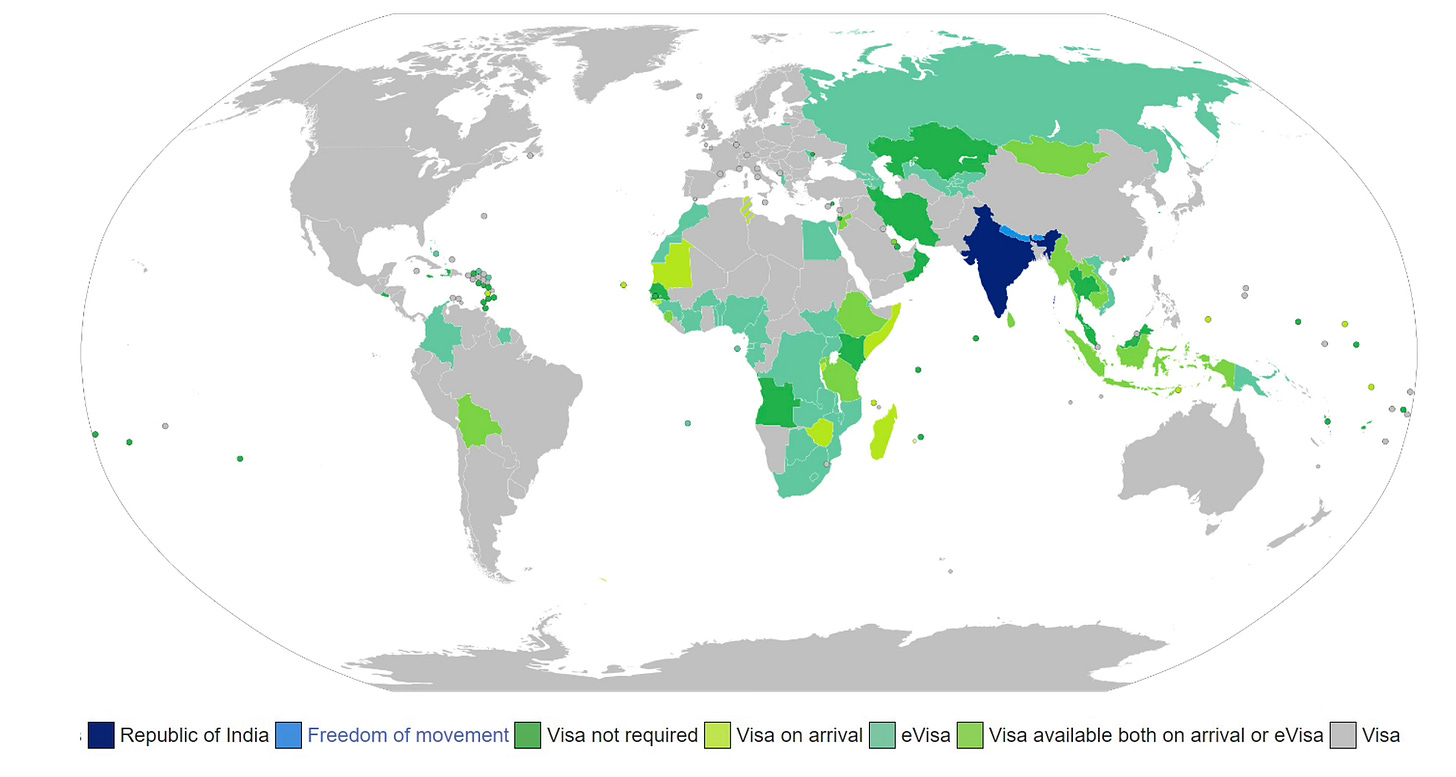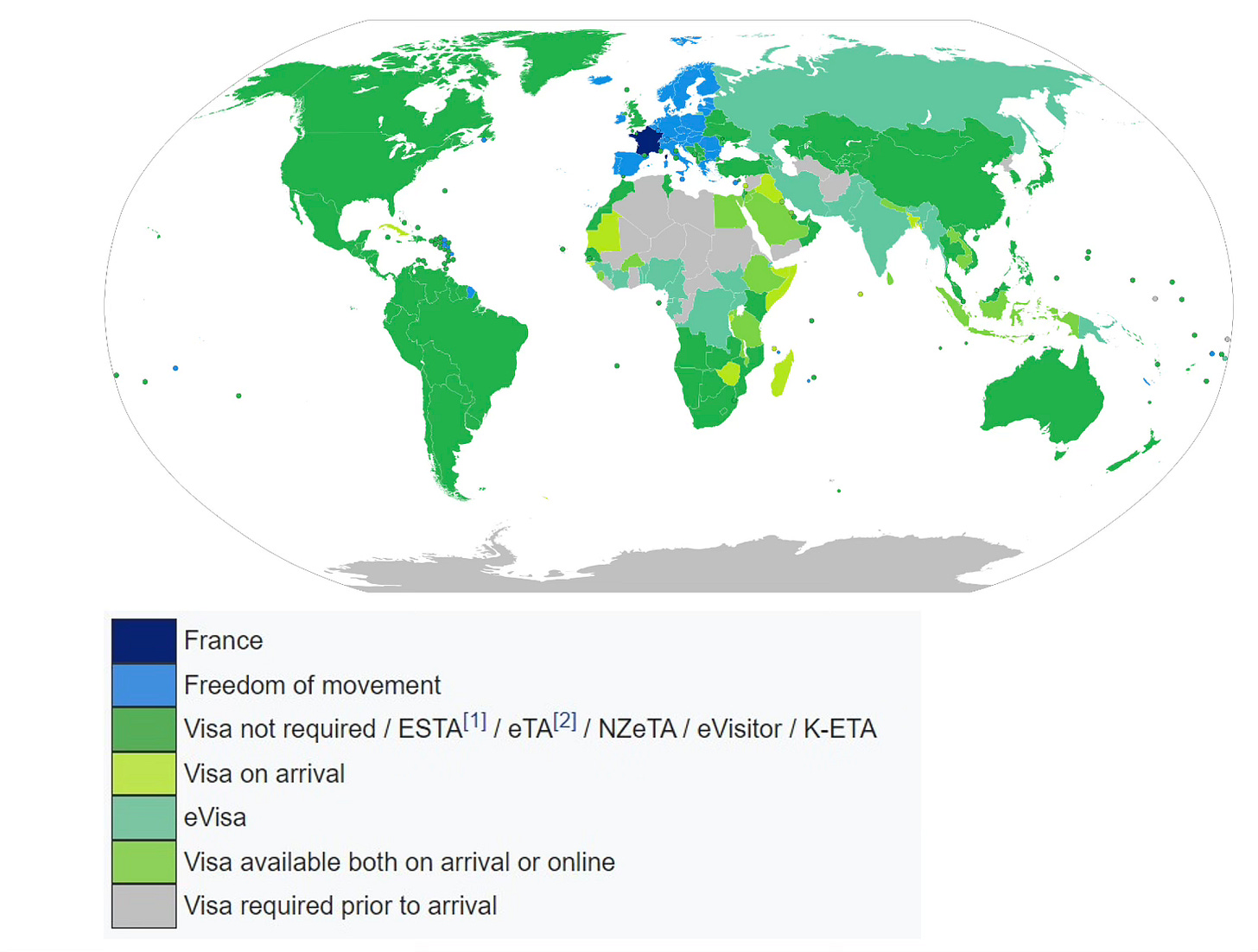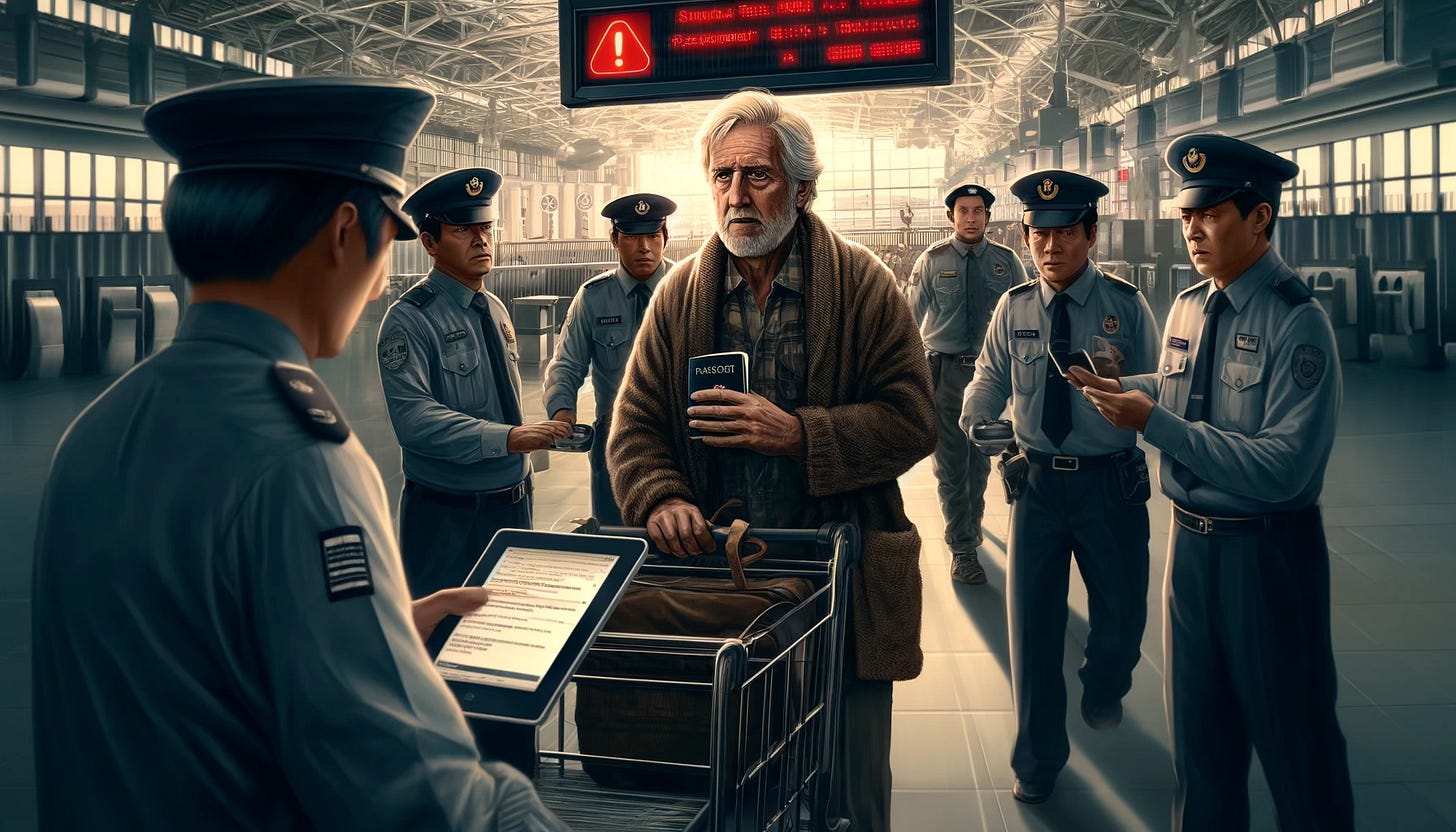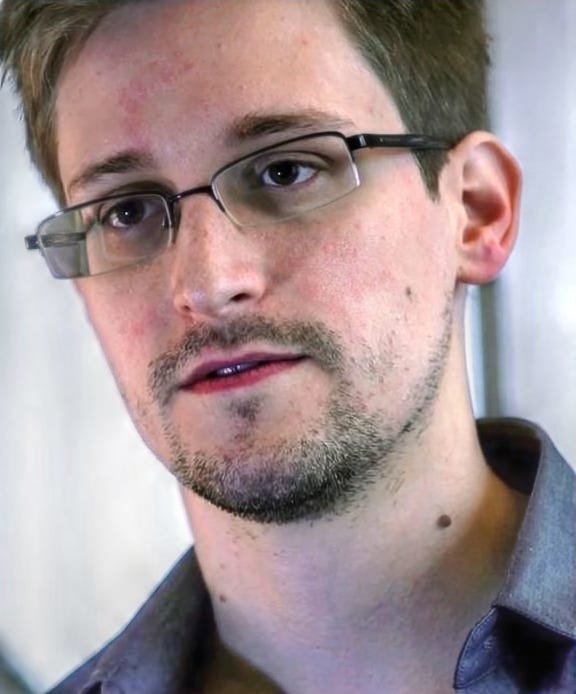Do You Need a 2nd Passport to Stay Free?
A shield against state overreach ?
Note: this is part 4 of a series on how to go further by integrating asymmetrical defenses against overeager states.
Here are the 3 articles in the series:
Americans who talk about the six flags recommend en masse taking a second nationality, and therefore a second passport, and we sometimes see non-American citizens taking their advice as it is, without nuance.
This is obviously a mistake, because Americans are in a unique situation, as we saw earlier: that of being citizens of the only Western country that taxes people on their nationality rather than their residence.
To take full advantage of the seven flags, they are therefore obliged to renounce their nationality, which they can only do by first acquiring another passport.
But that doesn't mean it's absolutely uninteresting to get a second citizenship if you're not American.
The main reasons are :
1. The passport of your nationality is weak
By "weak", we mean "that doesn't allow you to go to many countries without a visa".
An Indian or Nigerian millionaire, for example, has far less freedom to travel than a French minimum wage earner.
Look at the number of countries accessible to an Indian without a visa, regardless of income level1 :
For Nigerians it's even worse2 :
Compare this with France, for example3 :
As you can see, this is one of the greatest forms of discrimination in the modern world.
2. You want to increase your options
It could be as simple as being able to live in the country of your dreams thanks to your passport, or having insurance (a "plan B") in case something happens in your home country (war, economic crisis, etc.).
3. By philosophy
It's for this reason that I've acquired a second passport, that of the Caribbean nation of Antigua, which will enable me to go into more detail on this point for you.
My first value is freedom: that's why I left school at 18, with no diploma whatsoever in my pocket, to set up my first company.
That's why, disappointed that I'd become a slave to the company I created to be free, I set out to create another company that would serve my life, rather than the other way around, and then explain to anyone who would listen how to do it through my content, including my first book, Tout le monde n'a pas eu chance de rater ses études (in English : The Way of the Intelligent Rebel).
And I find it unbearable that my passport doesn't really belong to me, and that the government of my native country can cancel it whenever it likes, because for me, the freedom to travel is a fundamental freedom.
Can a government cancel a passport whenever it wants?
Absolutely. To convince you, let me tell you...
Bobby Fischer's story
If his name rings a bell, that's normal: he was the most famous world chess champion before Gary Kasparov.
His rise to the top was meteoric, culminating in his World Championship final match against Russia's Boris Spassky in 1972, an event that went beyond the game to become a symbol of the Cold War. Fischer's victory not only shattered twenty-four years of Soviet domination of the chess world, but also established him as an international icon.
There was also something special about the 1972 tournament: it was held in Iceland, which allowed millions of people to put the country on the map. We'll soon see why this is important.
After this feat, Bobby Fischer, an eccentric character, retired from the world of chess for twenty years.
Then, in the late 80s, he teamed up with various chess enthusiasts and admirers to organize a rematch against Boris Spassky.
The match finally took place in 1992, and as the main sponsor was Serbian, it was held in Yugoslavia.
Problem: at the time, Yugoslavia was under international sanctions, both from the UN and the USA, and as competitors could win prizes, the tournament was considered an economic activity falling under the sanctions.
The U.S. Treasury Department warned Fischer that, as a U.S. citizen, his participation in the tournament was illegal and could result in up to ten years' imprisonment. Fischer didn't care: during a press conference, he even spat on the letter the US government had sent him4.
After the match (which he won), he continued his life as a fugitive émigré, living in Hungary for a few years, then in the Philippines, then in Japan.
He managed to renew his passport at the American embassy in Switzerland in 1997, then to add pages to it in 2003, perhaps because the American computer systems at the time were not sufficiently connected.
But his run came to an end in 2004, when he was arrested in Japan. He tried to use his passport to board a plane, but this time an alarm sounded: the American authorities had finally woken up and cancelled his passport.
He then spent several months in prison, lost all his appeals, and was sentenced to be extradited to the United States .5
In desperation, he wrote to the government in Reykjavik, asking for Icelandic citizenship so he could obtain a valid passport and leave Japan a free man.
After deliberation, the Icelandic parliament unanimously decided to grant him citizenship, not least to thank him for putting Iceland on the map at the 1972 World Championships.
The Japanese authorities released him, and he flew to Iceland, where he spent the rest of his life6 .
This shows the power of a second passport: by deciding to cancel your passport for any reason it sees fit, a government can deprive you of the fundamental freedom to travel.
In the case of Bobby Fischer, it's also debatable whether the US government was right to prosecute a chess player who wasn't involved in politics and just wanted to exercise his talent regardless of location: the way it pressured Bobby Fischer can be seen as a form of censorship.
Having a second passport means that no government has this power any more: both governments would have to collude at the same time to prevent you from traveling, which is virtually impossible.
If Bobby Fischer had had a second passport before this episode, he wouldn't have had to spend months in jail in Japan.
A power that will expand?
Of course, this is a rather special case. But it's possible that countries will increasingly use their power to cancel passports.
The US government, for example, cancelled Edward Snowden's passport after his revelations, while he was on a plane to Russia. As a result, he spent forty days in Moscow airport, before the Russian government granted him asylum7 .
"Another special case," you might say.
Admittedly, few people will find themselves in a situation similar to that of Bobby Fischer and Edward Snowden.
How the IRS can cancel your passport
But there are far more trivial opportunities to cancel your passport.
For example, in the United States, the authorities can cancel your passport if you owe more than $62,000 to the IRS8 .
Yes.
What's more, since the USA is one of the only countries in the world to tax its citizens even if they live outside the country, as we've seen, this means that the American tax authorities can cancel the passport of an American living for twenty years in Portugal (for example), and too bad for the consequences: the only document he'll be able to obtain from the American consulate will be a pass to return to the USA, in order to explain himself to the tax authorities.
Other countries, such as Australia9 , cancel the passport of a taxpayer who owes too much tax.
Some countries, increasingly ready to do anything to restore their badly in shape finances, may decide to tax their citizens living abroad, and cancel the passports of those who don't comply.
And can you see how dictatorships could use the imposition on their citizenship, and this passport cancellation rule, to force dissidents back onto their soil?
Coming soon
In the next article, we’ll see how can you get a second passport quickly :)
Stay tuned ! In the meantime, feel free to follow Disruptive Horizons on X/Twitter & Linkedin, and join the tribe of Intelligent Rebels by subscribing to the newsletter :
And here are the 3 articles of this series :
Map by Passportguy, English Wikipedia.
"Bobby Fischer Ends Silence With Rancor", Roger Cohen, The New York Times, 1992
"Bobby Fischer's Deportation Appeal Rejected", Fox News, 2004
"Fischer 'put Iceland on the map'", Laura Smith-Spark, BBC, 2005
How Edward Snowden ended up in Russia, The Week, 2022
"Revocation or denial of passport in cases of certain unpaid taxes", IRS, 2024. The amount is revalued each year in line with inflation.
"Departure Prohibition Orders - how the ATO can stop you from leaving Australia by issuing a DPO", Waterhouse Tax Lawyers, 2017










As an American I always struggle with all this advice. Our families live in America and we’re not going to give up spending at least half the year with them. So the tax burden is just inevitable. But we do want second passports for diversification and are still researching where we would like that to be. What is the ideal passport (and place to live) if you’re going to keep your American one?
Before WW1; passports were voluntary and optional. We should go back to that model. Otherwise, we are at the whims of the State if the State goes to war and they can, technically, draft passport holders. How do you get around this?